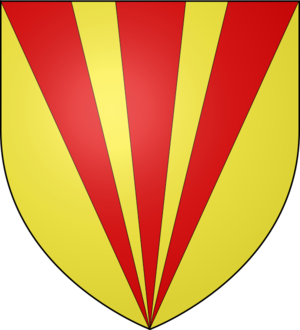John of Scotland, Earl of Huntingdon
| John of Scotland | |
|---|---|

The coat of arms of John of Scotland,
7th Earl of Chester.[dubious ] |
|
| Born | 1207 |
| Died | 1237 |
| Other names | John de Scotia |
| Ethnicity | Anglo-Scottish |
| Title | Earl of Chester |
| Term | 1232–1237 |
| Predecessor | Matilda of Chester Countess of Salisbury suo jure |
| Successor | Extinct - reverted to crown |
John of Scotland (or John de Scotia), 9th Earl of Huntingdon and 7th Earl of Chester (c. 1207 – 6 June 1237), sometimes known as "the Scot", was an Anglo-Scottish magnate, the son of David of Scotland, Earl of Huntingdon by his wife Matilda of Chester, daughter of Hugh de Kevelioc.
John married Elen ferch Llywelyn, daughter of Llywelyn the Great, in about 1222.
John became Earl of Huntingdon in 1219 on the death of his father.
On the death of John's maternal uncle, Ranulph de Blondeville, Earl of Chester, on 26 October 1232, the Earldom of Chester was inherited by John's mother Matilda (Maud) of Chester (Ranulph's eldest sister). Less than a month later with the consent of the King, she gave an inter vivos gift of the earldom to her son John who became Earl of Chester by right of his mother.[1] He was formally invested by King Henry III as Earl of Chester[2] on 21 November 1232.[3] He became Earl of Chester in his own right six weeks later on the death of his mother in January 1233.
John died childless on 6 June 1237, aged 30. He too, like his uncle Ranulph before him, left four sisters as his co-heirs. They agreed to share the estates between them, and to make the husband of the eldest sister Christian, William de Forz, Earl of Chester and Huntingdon by right of his wife. However Henry III decided that the earldoms should be annexed to the crown "lest so fair a dominion should be divided among women".[3] In 1246, Henry bought the honour (estate) of Chester from John's four sisters. The earldom of Chester was recreated for Simon de Montfort in 1264, and the earldom of Huntingdon was recreated in 1337 for William de Clinton.
| Peerage of England | ||
|---|---|---|
| Preceded by | Earl of Huntingdon and Earl of Northampton 1219–1237 |
Succeeded by reverted to crown next held by William de Clinton in 1337 |
| Preceded by
Matilda of Chester
Countess of Salisbury suo jure |
Earl of Chester 1232–1237 |
Succeeded by reverted to crown next held by Simon de Montfort in 1264 |
References
- ↑ Burke, John, A general and heraldic dictionary of the peerages of England, Ireland, and Scotland
- ↑ Lua error in package.lua at line 80: module 'strict' not found.,[better source needed]
- ↑ 3.0 3.1 Earl of Chester
- Articles lacking reliable references from August 2012
- Wikipedia articles incorporating an MLCC with a warning
- All accuracy disputes
- Articles with disputed statements from March 2011
- Pages using infobox person with unknown parameters
- Infobox person using ethnicity
- Articles with hCards
- Use dmy dates from January 2012
- Earls of Chester (1071)
- House of Dunkeld
- 1207 births
- 1237 deaths